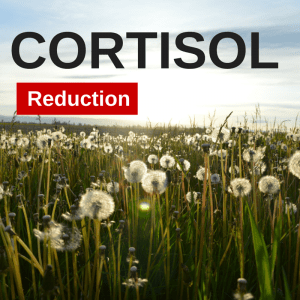 Do any of these symptoms sound familiar?
Do any of these symptoms sound familiar?
1. You’re not sleeping well.
2. Even when you sleep well, you’re still tired.
3. You’re gaining weight, especially around your abdomen, even when you eat well and exercise.
4. You catch colds and other infections easily.
5. You crave unhealthy foods.
6. You experience backaches and headaches.
7. Your sex drive reduced.
8. Your stomach problems.
9. You feel anxious.
10. You feel blue.
High levels of cortisol could be the problem
Cortisol levels normally drop at night so that your body can relax and recharge. However during times of stress your cortisol levels rise and even though you’ve been tired all day, you find you’re suddenly wide awake, just when it’s time to go to bed!
Over longer periods the high levels of cortisol will cause your adrenal glands to deplete and you end up with chronic fatigue.
Cortisol deactivates your body’s natural repair mechanisms, which means that your immune system which is perfectly designed by nature to keep you healthy gets lowered.
When stress hormones are high, hormones like testosterone drop and so will your sex drive.
You might experience nausea, heartburn, abdominal cramps, diarrhoea, or constipation as a result of too many stress hormones.
Cortisol and epinephrine can lead to jitters, nervous stomach, feelings of panic, even paranoia.
High levels of cortisol suppress production of serotonin, you’ll find yourself feeling everything is going wrong and become hyper sensitive to anything that isn’t perfect.
Cortisol is often associated with anything that provokes the “Flight or Fight” response. So learning how to deal with stress and reducing it is critical in managing your cortisol levels.
So why do we need cortisol in the first place?
It’s a necessary stress hormone designed to help you wake up in the morning and to cope with danger. A spike in cortisol triggers the release of amino acids from the muscles, glucose from the liver, and fatty acids into the blood stream so the body can access a tremendous amount of energy.
The trouble is, in today’s world, we are unlikely to be fighting or running away from anything that causes us stress, so our body doesn’t naturally burn up the excess cortisol produced. We just sit there, fuming or stressing, which makes us even worse. It’s a vicious circle.
As cortisol build up it puts the body in to a “catabolic” state. A destructive phase that results in tissue destruction, muscle loss, bone loss and immune depression. As you get older the levels also naturally increase.
How you can reduce cortisol levels
Natural stress relievers
Meditation
Whether it’s just a few minutes with your eyes close, guided relaxation using an audio program or full blown transcendental meditation, it all helps!
Music
Studies have found that listening to music during stressful situations can subdue the increase in cortisol.
Laughter
Have a good laugh can reduce your cortisol levels by 39% so do feel bad about watching those funny videos on you tube, it’s one of the most effective ways to reduce your stress hormones!
Chew Gum
The Northumbria University found that people who chewed gum during times of moderate stress had 12% less cortisol that those who didn’t
Gentle Exercise
Think yoga or pilates, rather than high intensity cardio like running as these can actually raise your cortisol levels
Making Changes to Your Diet
Processed foods, especially simple carbohydrates and sugar, cause a spike in cortisol. Too many processed foods increase blood sugar levels, which in turn causes you to feel anxious.
Try to avoid:
- White bread
- “Regular” pasta (not whole wheat)
- White rice
- Sweets, cakes, chocolates*, etc.
Things for you enjoy more of (the last one is my favourite!)
Water
Make sure you’re getting enough water. If your urine is darker coloured when you go pee, it’s probably a sign that you’re not drinking enough water. Adequately-hydrated individuals have urine that is light, almost water-like, in appearance.
Black Tea
Black tea was found to lower overall cortisol levels in a group of people performing stressful tasks.
Spinach
The magnesium in these leafy greens help balance your body’s production of cortisol. Try tossing the spinach with a citrus-based fruit for a delicious salad loaded with vitamin C.
Beans and Barley
Phosphatidylserine, a phospholipid located in cell membranes, may help counteract the adverse effects of cortisol. Add phosphatidylserine-rich foods, like white beans and barley, to your diet to help calm your nerves and improve your sleep.
Citrus Fruits
When stress gets you down, try replacing carb-rich snacks with a variety of citrus fruit. Research has shown that vitamin C-rich produce, like oranges and kiwis, help slow the production of cortisol.
Omega-3 Fatty Acids
The secret’s out: Omega-3s have mega health benefits! Studies show that omega-3s not only inhibit inflammation, but also help to reduce cortisol levels and perceived stress. If pills and supplements don’t excite you, try incorporating omega-rich mackerel, haddock, sardines, flaxseed and walnuts into your daily meal plan.
Holy Basil
Holy basil, also known as tulsi, is another effective stress-fighting solution. This tasty herb is part of a class of herbs called adaptogens that help reduce the production of stress hormones. If you can’t grow a holy basil plant in your backyard, you can still reap the benefits of this healthy herb by brewing a cup of basil tea.
Zinc
Studies have shown zinc can help inhibit the secretion of cortisol. Fight off stress by ensuring your diet has enough sources of zinc. Just three ounces of lean pot roast or short ribs can provide a substantial amount of your daily zinc needs. If seafood is your preference, opt for oysters. Just six medium-sized oysters contain over 70 mg of zinc! but if the thought of that makes you heave, you can of course just take a tablet 🙂
Rhodiola
Try out rhodiola when your cortisol is high. Rhodiola is an herbal supplement related to ginseng, and a traditional remedy for lowering cortisol.
Dark Chocolate
Finally some good news! The naturally occurring antioxidants in dark chocolate can help your body decrease inflammation and slow cortisol production. The results of one study indicated that consuming about 40 grams per day reduced cortisol levels. Personally I try to aim for chocolate that is over 80% cocoa solids
